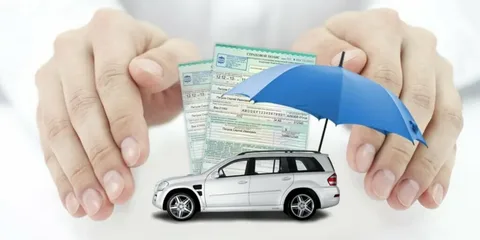Introduction to Car Insurance
Table of Contents
What is Car Insurance?
You may safeguard yourself financially in the case of an accident or theft by entering into an insurance policy with a provider. The insurance provider promises to compensate you for losses according to your policy in return for your premium payment.

Importance of Car Insurance
Having auto insurance is crucial as it safeguards your financial situation. You may avoid paying a hefty sum out of pocket if you have the correct insurance; accidents can happen at any time. Furthermore, in the majority of states, it is mandated that all drivers possess a minimum amount of coverage.
Types of Car Insurance Coverage
Liability Coverage
Many states require its residents to get liability insurance. It pays for medical expenses and property damage to other persons in the event of an accident. Liability for physical harm and property damage are the two primary parts.
Collision Coverage
No matter who is at blame in an accident, collision coverage will pay for repairs to your vehicle. For more recent or costly automobiles, this insurance is a must-have.
Comprehensive Coverage
Theft, fire, vandalism, and natural calamities are not limited to collisions when you have comprehensive coverage. Comprehensive auto insurance kicks in in the event that your vehicle is stolen or destroyed in an accident that wasn’t your fault.
Personal Injury Protection (PIP)
Personal injury protection (PIP) insurance, often called no-fault insurance, pays for medical bills, lost income, and other expenditures if you or your passengers are hurt in an accident. It’s not mandatory in all states, although it is in others.
Uninsured/Underinsured Motorist Coverage
This policy safeguards you in the event that an accident occurs involving a motorist who either does not possess insurance or does not possess a enough amount of insurance to compensate for your damages. It can also protect you in the event of a hit-and-run.
Factors Influencing Car Insurance Rates

Age and Gender
Because of their inexperience behind the wheel and the increased likelihood of accidents, insurance companies often charge younger drivers, particularly teens, greater premiums. Another factor is gender; for example, compared to young female drivers, young male drivers frequently pay more.
Driving Record
When calculating your insurance premiums, your driving record plays a significant role. You should expect your premiums to go up if you have a history of accidents or traffic offenses, and down if you don’t.
Location
The cost of auto insurance is influenced by your residence. In general, premiums are higher in more densely populated, urban regions due to factors such as greater crime and traffic. Rates can also be affected by regional meteorological factors and accident data.
Vehicle Type
Your auto insurance premiums are affected by the year, model, and make of your vehicle. The greater repair expenses and theft risk associated with high-performance or luxury automobiles lead to higher insurance premiums.
Credit Score
Insurance prices are based on a customer’s credit score in several states. Premiums might go down with a good credit score and up with a bad one.
How to Choose the Right Car Insurance Policy
Assess Your Needs
First things first: take stock of your spending, your driving history, and the worth of your vehicle. Before you get into an accident, think about how much insurance you’ll need.
Compare Quotes
Find the best insurance prices by getting quotes from various businesses. Get the best price possible by using internet comparison tools and talking to agents.
Check the Insurer’s Reputation
Investigate the credibility of insurance providers by perusing customer evaluations and ratings provided by third-party organizations such as Consumer Reports and J.D. Power. Check if the company has a solid reputation for satisfying customers and claims.
Understand the Policy Details
To learn about the coverage and exclusions, read the policy terms thoroughly. Limits, exclusions, and deductibles must be carefully considered. Feel free to inquire if you have any queries.
Understanding Car Insurance Premiums

What are Premiums?
The money you pay each month to your insurance provider in return for their guarantee of coverage is called a premium. Instalments can be made on a monthly, quarterly, or yearly basis.
How are Premiums Calculated?
Insurance rates are determined by a number of variables, such as your age, driving history, place of residence, kind of vehicle, and credit rating. The risk of insuring you is determined by statistical data.
Ways to Lower Your Premiums
- A greater deductible reduces premiums but increases out-of-pocket costs in the event of a claim.
- You can save money by bundling your auto insurance with additional policies from the same insurer, such as home and renters.
- To keep your insurance rates low, maintain your driving record clean of accidents and infractions.
- Get the Most Out of Your Discounts: Find out what discounts are available and make sure you’re getting all of the ones you qualify for.
Common Car Insurance Discounts
Multi-Policy Discount
Saving a ton of money is possible when you bundle products, like house and car insurance, with the same provider.
Good Driver Discount
Driving safely is rewarded by insurance providers with lower premiums. You can be eligible for this discount if you’ve maintained a spotless driving record for a specific period of time.
Safety Features Discount
Advanced safety equipment, such as anti-lock brakes, airbags, and anti-theft systems, are frequently eligible for discounts on vehicles.
Low Mileage Discount
You could be able to get a low mileage discount if your annual mileage is lower than the typical driver’s. Insurers see drivers with less mileage as having a lower risk.
How to File a Car Insurance Claim
Steps to Take After an Accident
- Protect People: Find out whether anyone is hurt, and go to a safe place if you can.
- Make a 911 call: Document the incident by filing a police complaint.
- Take Notes of the Setting: Record the location of the collision, the cars involved, and any casualties by taking pictures.
- Get the other drivers’ contact and insurance details and exchange them.
- Alert Your Insurance Company: The first step in filing an insurance claim after an accident is contacting your provider.
Documentation Required
- What you’ll need to submit a claim:
- Evidence include the police report
- Pictures of the wreckage and the accident site
- Names, numbers, and email addresses of any additional drivers or witnesses
- If injuries occurred, medical records
Dealing with Adjusters
The loss and compensation will be determined by an insurance adjuster. Be forthright and helpful, and make note of everything you say.
Myths and Misconceptions About Car Insurance
Red Cars Cost More to Insure
Your insurance prices are unaffected by the color of your vehicle. What matters most to insurance companies is the year, model, safety features, and manufacturer of your car.
Only Older Drivers Pay Higher Rates
Although rates may be higher for older drivers owing to age-related considerations, the highest premiums are usually paid by young and inexperienced drivers.
Comprehensive Coverage Protects Everything
The majority of non-collision-related accidents are protected by comprehensive coverage, although it does not cover everything. Get to know the limits of your policy by reading it.
The Role of Car Insurance in Road Safety
Encouraging Safe Driving
Good driver discounts and other insurance incentives motivate people to drive safely. Furthermore, driving more carefully and with less anxiety can be achieved by having financial protection.
Financial Protection
If you have auto insurance, you won’t have to worry about the astronomical expenses associated with repairs, medical bills, and accidents.

Legal Compliance
Automobile insurance is legally required in the majority of states. Having insurance protects you against fines and stays you in compliance with the law.
Car Insurance for New Drivers
Challenges Faced by New Drivers
Due to their inexperience behind the wheel and the increased likelihood of accidents, new drivers frequently encounter higher insurance premiums. It might be difficult to get economical insurance.
Tips for Lowering Premiums
- Taking a defensive driving course may qualify you for a discount from some insurance companies.
- Be a Safe Driver by Opting for a Vehicle with Excellent Safety Features and Ratings.
- Adding a new driver to a parent’s insurance policy usually results in cheaper rates for the new driver.
Best Policies for New Drivers
Try to choose insurance plans that cover new drivers, have reasonable costs, and attractive discounts for drivers. Verifying different quotations is crucial.
Impact of Driving Habits on Car Insurance
Safe Driving Practices
To keep your driving record spotless and your insurance costs low, practice safe driving behaviors including following traffic regulations and avoiding distractions.
Impact of Traffic Violations
A driving under the influence conviction or speeding ticket can have a major impact on your auto insurance rates. Maintaining low rates requires avoiding infractions.
How to Improve Your Driving Record
To enhance and preserve a solid driving record, enroll in a defensive driving school, drive cautiously, and follow all traffic rules.
Car Insurance and Rental Cars
Do You Need Extra Coverage?
If your own auto insurance covers rentals, you might not need additional coverage when you hire a car. Prior to renting, be sure to consult your insurance.
Understanding Rental Car Insurance Policies
Rental automobile agencies often provide a range of insurance policies, including liability and accident damage waivers. Find out what each one protects you from and determine if you really need it.
Technology and Car Insurance
Usage-Based Insurance
Insurance policies that track your usage, usually using telematics, keep tabs on how you drive and change your rates accordingly. Saving money is possible with these programs for safe drivers.
Telematics
Your speed, braking patterns, and mileage can be monitored via telematics equipment. Insurers can use this data to provide individual rates and create incentives for safe driving.
Future Trends in Car Insurance
Technological developments like driverless cars and blockchain for claims processing are part of the future of auto insurance and may bring forth more efficient and tailored policies.
International Car Insurance
Driving Abroad
A green card or foreign auto insurance coverage may be required for driving overseas. Going abroad might leave you unprotected by your home insurance.
Getting Coverage for International Travel
To learn more about your foreign coverage choices, contact your insurance carrier. You should probably get travel insurance, either permanently or just for the duration of your trip.
Conclusion
One must have auto insurance in order to own and operate a motor vehicle. You can make better selections if you know what kinds of coverage are available, what variables influence your rates, and how to select the best insurance for your needs. You may get the coverage you need without going into debt if you drive safely and take advantage of discounts.
FAQs
At a bare minimum, what does the law say about auto insurance?
While each state has its own minimum insurance requirements, most states’ policies cover both bodily injury and property damage liability.
Is it possible for my auto insurance premium to fluctuate?
Factors such as changes to your driving record, credit score, location, and the addition of additional drivers or cars to your policy can, in fact, affect your auto insurance quote.
Can auto insurance pay for stolen vehicles?
Theft, vandalism, natural catastrophes, and other non-collision situations are all covered by comprehensive auto insurance.
How can I get auto insurance while I’m strapped for cash?
Consider increasing your deductible, shopping around for a better deal, getting insurance estimates from other companies, or researching state programs that help low-income drivers if you’re having trouble affording auto insurance.
How can I change auto insurance providers?
Get many quotations from other insurance providers, compare their coverage, and then let your existing insurer know you’ve decided to switch. Make sure there isn’t a coverage gap when things are changing.





